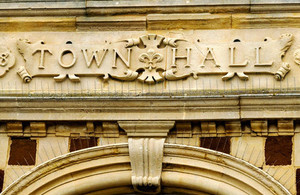Government clampdown on fraud
Lord Ahmad announces extra funding for a range of council-led projects to claw back billions of pounds of taxpayers’ money lost to fraud.

Communities Minister Lord Ahmad today (26 November 2014) announced extra funding for a range of council-led projects to claw back billions of pounds of taxpayers’ money lost every year to fraud.
This government has repeatedly challenged councils to do more, work together and use innovative financial management to reduce the £2 billion the sector loses every year to fraud.
The minister was clear councils must do all they can to address fraud and also to turn idle assets into money to protect frontline services. The government is allowing councils to use money raised from the sale of assets, such as empty buildings and redundant brownfield land, to help pay for the costs of improving local services as well as keeping Council Tax down.
The department is providing a further £16 million to councils who are raising their game through a range of innovative projects across the country to tackle fraud. This clamp down on money wasted through fraud will tackle social housing tenancy cheats, business rates evasion, procurement fraud and social care and health tourism. This money comes on top of £19 million already announced earlier in the year to help councils fight housing tenancy fraud.
Lord Ahmad of Wimbledon, who is leading the department’s push against local government fraud, said:
We will not tolerate fraudsters who rip off councils and hardworking taxpayers which is why this government is pumping millions of pounds into helping councils catch these thieves and claw back this money.
Our clamp down on money wasted through fraud will help expose this scourge, free up homes for the families that really need them and protect frontline services.
Councils must be confident and step forward to promote prosecutions so they may act as a deterrent to others.
Many of the successful bids came from partnerships of councils that will deliver benefits to many parts of the country. Prominent examples include:
-
a project to tackle health tourism in Croydon by working with government departments and cross checking data to identify those who are ineligible and therefore reduce pressure on the local health service, cut hospital waiting times and reduce demand for council services
-
a partnership in south west London, led by Wandsworth, which will set up a counter fraud service across 5 boroughs combining expertise and intelligence to clamp down on social housing tenancy fraud and stop corporations ripping off local taxpayers
-
dozens of councils have joined forces to develop a smart phone app to enable residents to easily alert them to cases of suspected fraud and expose prosecutions to act as a deterrent; this is being led by Bromley on behalf of 38 councils but more than 100 others have expressed an interest to opt in and share the benefits
-
3 Lincolnshire councils, led by East Lindsey, will tackle business rates fraud so law-abiding firms do not have to compete unfairly against those who fail to pay their way; a shared assurance team will work with the Valuation Office Agency to expose companies breaking the law and maximise the business rates collected by the authorities.
Further information
Estimated losses to local government in the 2013 National Fraud Indicator was £2.1 billion, which was broken down as follows:
| Fraud type | Fraud loss |
|---|---|
| Housing tenancy fraud | £845 million |
| Procurement fraud | £876 million |
| Payroll fraud | £154 million |
| Council Tax fraud | £133 million |
| Blue Badge Scheme misuse | £46 million |
| Grant fraud | £35 million |
| Pension fraud | £7.1 million |
The government is investing some £35 million to help councils tackle fraud.
In April, as part of the crackdown ministers announced £19 million to help councils fight against housing tenancy fraud.
Today a further £16 million was announced to support councils with innovative ideas on how to clamp down on other types of fraud.
A separate £600,000 will help provide strategic support for local authorities in tackling fraud. Of which Lord Ahmad recently announced £100,000 of funding to the network of counter fraud authorities (Fighting Fraud Locally) to develop a counter fraud strategy for local government. A further announcement on the remaining £500,000 will be made shortly.
CIPFA has established a new centre of excellence for counter fraud which builds on their expertise in this area. The centre will work in partnership with a wide range of interested parties to support senior local authority leaders in management, governance and finance to tackle fraud and corruption.
The latest national statistics on fraud and error in the benefit system show that losses due to fraud and error in housing benefit are at a record high. Central and local government are working closely together to address these unacceptable losses and provide value for money for the tax payer and further information will be announced in due course.
See a list of the successful bids for the Counter Fraud Fund.
Office address and general enquiries
2 Marsham Street
London
SW1P 4DF
Email correspondence@communities.gov.uk
General enquiries: please use this number if you are a member of the public 030 3444 0000
If your enquiry is related to COVID-19 please check our guidance page first before you contact us - https://www.gov.uk/guidance/coronavirus-covid-19-guidance-for-local-government.
If you still need to contact us please use the contact form above to get in touch, because of coronavirus (COVID-19). If you send it by post it will not receive a reply within normal timescale.
Media enquiries
Email newsdesk@communities.gov.uk
Please use this number if you are a journalist wishing to speak to Press Office 0303 444 1209